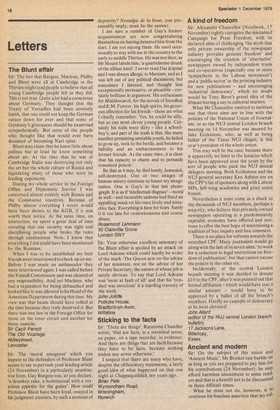The Blunt affair
Sir: The fact that Burgess, Maclean, Philby and Blunt were all at Cambridge in the Thirties might lead people to believe that all young Cambridge people felt as they did. This is not true. Quite a lot had a conscience about Germany. They thought that the Treaty of Versailles had been unwisely harsh, that one could not keep the German nation down for ever and that some of Germany's grievances should be examined sympathetically. But none of the people who thought like that would ever have dreamed of becoming Nazi spies.
Blunt may claim that he knew little about politics but at least he knew something about art. At the time that he was at Cambridge Stalin was destroying not only the art but the whole culture of Russia and liquidating many of those who were its leading exponents.
During my whole service in the Foreign Office and Diplomatic Service I was concerned almost entirely with Russia and the Communist countries. Because of Philby almost everything I wrote would have been shown to the KGB, if it was worth their notice. At the same time, on instruction, we spent a great deal of time ensuring that our security was tight and disciplining people who broke the rules through carelessness. Now, I know that everything I did could have been monitored by the Russians, When I was to be established my best friends were interviewed to check up on me. Before I was made an ambassador they were interviewed again. I was called before the Vassal! Commission and was cleared of any responsibility. And yet Maclean, who had a reputation for being debauched and looked like it, was allowed to be Head of the American Department during this time. My view was that heads should have rolled at the time because they truly deserved it. But there was one law in the Foreign Office for those on the inner circuit and another for those outside.
Sir Cecil Parrott
The Old Vicarage, Abbeystead, Lancaster Sir: The 'moral smugness' which you impute to the defenders of Professor Blunt seems to me to pervade your leading article (24 November) in a particularly unattractive form. Guy Burgess was, so you declare, 'a drunken rake, a homosexual with a voracious appetite for the gutter'. How could Professor Blunt have been loyal, swayed in his judgment, etcetera, by such a monster of depravity? Nostalgie de la boue, you presumably imply, must be the answer.
I am sure a number of Guy's former acquaintances are now congratulating themselves on having detested him from the start. I am not among them. He used occasionally to stay with me in the country in the early to middle Thirties. He was not then, as Mr Mount labels him, 'a quarrelsome drunk of the silliest kind'. I never read Das Kapital and I was always allergic to Marxism, and so I was left out of any political discussions; but sometimes I listened, and thought him exceptionally persuasive, or plausible —certainly brilliant in argument. His enthusiasm for Middlem arch, for the novels of Stendhal and E.M. Forster, his high spirits, his generous affection for his friends — these are what I chiefly remember. Yes, he could be silly, but so can most clever young people. Certainly his nails were dirty — like a schoolboy's; and part of the truth is that, like many another promising unstable youth, he failed to grow up, took to the bottle, and became a liability and an embarrassment to his former friends. At the same time, it is clear that his capacity to charm and to persuade remained potent.
Be that as it may, he died lonely, homesick, self-destroyed. One or two images of human misery continue to haunt my imagination. One is Guy's in that last photograph. It is as if 'intellectual disgrace' — moral as well —and incurable sadness had fixed an appalling mask on his once lively and attractive face. Everything is here for tears. Surely it is too late for censoriousness and coarse abuse.
Rosamond Lehmann
30 Clareville Grove London SW7
Sir: Your otherwise excellent summary of the Blunt affair is spoiled by an attack on Lord Adeane which could hardly be wider of the mark. The Queen acts on the advice of her ministers, not on the advice of her Private Secretary, the nature of whose job is surely obvious, To say that Lord Adeane was 'most at fault of all' and that his 'conduct was atrocious' is a startling travesty of the truth.
John Jolliffe
Potticks House, Bradford-on-Avon, Wiltshire











































 Previous page
Previous page